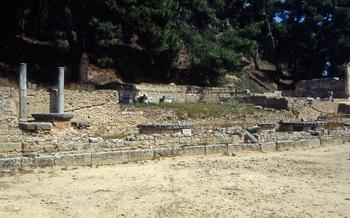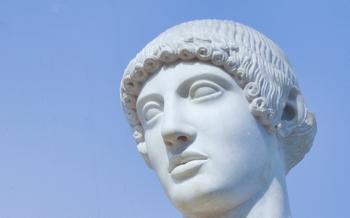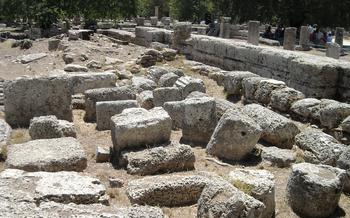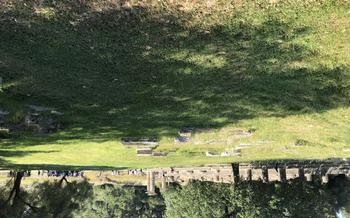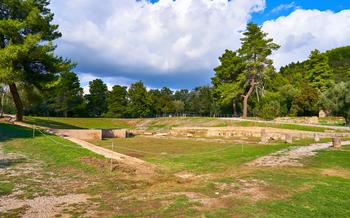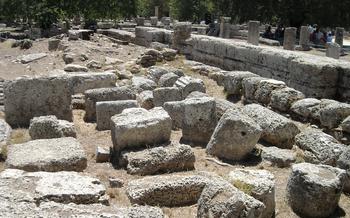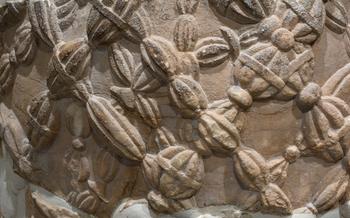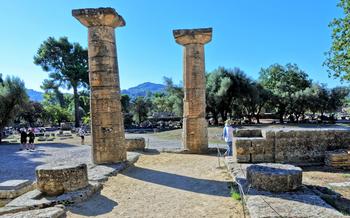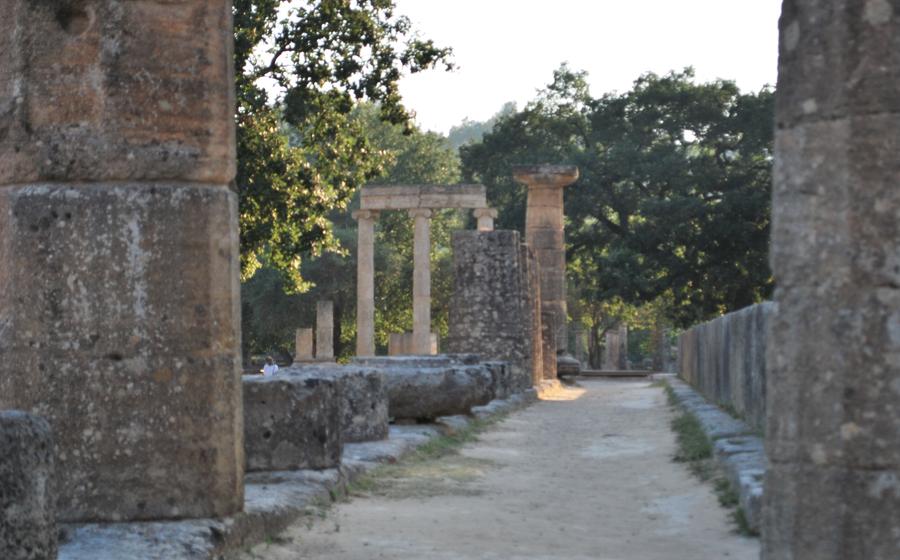
Epicurean Apollo Temple
- Tracing the Footsteps of Ancient Athletes
- Unveiling the Temple of Epicurean Apollo
- Witnessing the Olympic Flame Lighting Ceremony
- Indulging in Local Delights
- Discovering the Enchanting Village of Olympia
- Venturing Beyond Olympia
- Practical Tips for Visiting Olympia
- Unraveling the Mysteries of the Oracle at Delphi
- Hiking the Majestic Mount Olympus
- Relaxing on the Sandy Beaches of the Peloponnese
- Exploring the Ancient City of Mycenae
- Exploring the Ancient City of Corinth
- Insider Tip: Unveiling Hidden Gems
Tracing the Footsteps of Ancient Athletes
Olympia, the birthplace of the Olympic Games, holds an unparalleled significance in the history of sports and athleticism. In ancient times, athletes from across the Greek world converged on this sacred site to compete in a variety of sporting events, showcasing their strength, agility, and determination. The Olympic Games were not merely sporting competitions; they were religious and cultural festivals that celebrated the ideals of physical perfection, fair play, and the pursuit of excellence.
At the heart of the ancient Olympic Games lay a deep connection to the gods. The athletes competed in honor of Zeus, the king of the gods, and his son Apollo, the god of music, poetry, and prophecy. The games were held every four years, coinciding with the religious festivals honoring these deities. The athletes believed that victory in the games brought divine favor and eternal glory.
The athletic events at Olympia were diverse and included running races, wrestling, boxing, pankration (a combination of wrestling and boxing), chariot racing, and the pentathlon (a combination of five events: running, jumping, discus throw, javelin throw, and wrestling). The competitions were fiercely contested, and the winners were celebrated as heroes.
Archaeological excavations at Olympia have unearthed a wealth of artifacts and structures that provide valuable insights into the ancient Games. These include the starting line of the running races, the wrestling and boxing arenas, and the hippodrome, where chariot races took place. The discoveries at Olympia have helped us to understand the rules and rituals of the ancient Games, as well as the training methods and equipment used by the athletes.
Unveiling the Temple of Epicurean Apollo
Amidst the rolling hills of the Peloponnese, the Temple of Epicurean Apollo stands as a testament to ancient Greek architectural prowess. Perched atop Mount Kotylion, the temple offers breathtaking views of the surrounding countryside, making it a sight to behold.
Dating back to the 5th century BC, the temple was constructed in honor of Apollo, the god of music, healing, and prophecy. Its impressive Doric columns and well-preserved sculptures narrate tales of ancient mythology and religious practices. The temple's unique location, away from major population centers, has contributed to its remarkable preservation, making it one of the best-preserved ancient Greek temples.
The history and mythology surrounding the Temple of Epicurean Apollo are captivating. According to legend, the temple was built as a tribute to Apollo after he cured a plague that had ravaged the region. The temple's remote location is believed to have been chosen to create a sacred space for healing and contemplation.
In the 2nd century AD, the temple underwent significant renovations and additions. A stoa, or covered walkway, was constructed along the temple's north side, and a large altar was erected in front of the temple. These additions further enhanced the temple's grandeur and importance as a religious and civic center.
Over the centuries, the Temple of Epicurean Apollo has faced the ravages of time and natural disasters. Earthquakes and erosion have taken their toll, but extensive restoration efforts have been undertaken to preserve this architectural masterpiece. The temple's columns have been carefully restored, and its sculptures have been meticulously cleaned and repaired. As a result of these efforts, the Temple of Epicurean Apollo continues to stand as a testament to the enduring legacy of ancient Greek architecture and culture.
Witnessing the Olympic Flame Lighting Ceremony
Every four years, the world's attention turns to Olympia for the Olympic Games. But even when the Games are not taking place, visitors can witness a special ceremony that evokes the ancient Olympic spirit—the lighting of the Olympic flame.
The ceremony takes place at the Temple of Hera, the goddess of marriage and childbirth, who was worshipped in Olympia alongside Zeus. The flame is lit using a parabolic mirror to focus the sun's rays on a torch, a ritual that has been performed since 193
Once lit, the flame is carried by a relay of runners to the host city of the Olympic Games. The relay follows a route that passes through many countries, symbolizing the global nature of the Olympic movement.
Attending the Olympic flame lighting ceremony is a unique opportunity to experience the Olympic spirit firsthand. It is a moving and inspiring event that celebrates the ancient traditions of Olympia and the modern ideals of the Olympic Games.
Indulging in Local Delights
Olympia offers a culinary journey that tantalizes the taste buds with authentic Greek flavors. Immerse yourself in the vibrant local markets, brimming with an array of fresh produce, fragrant herbs, and delectable cheeses. Engage with friendly vendors who share their knowledge about traditional ingredients and culinary secrets.
Indulge in must-try dishes such as succulent grilled meats, slow-cooked stews, and freshly caught seafood. Savor the flavors of "souvlaki," tender skewers of grilled meat, or delight in the rich taste of "moussaka," a hearty casserole of eggplant, potato, and minced meat. Don't miss the chance to sample the local wines, produced in the vineyards that grace the Peloponnese landscape.
Visit traditional tavernas nestled amidst the cobbled streets, where the air is filled with the aroma of wood-fired ovens and the sounds of lively conversations. Experience the warmth of Greek hospitality as you relish delicious dishes paired with local wines, creating a memorable culinary adventure.
Discovering the Enchanting Village of Olympia
Nestled in the heart of the Peloponnese, the village of Olympia exudes a charm that transports visitors back in time. As you stroll along the cobblestone streets, you'll encounter quaint shops selling local crafts, souvenirs, and delicious treats. The village is a treasure trove of traditional Greek culture, where you can find handmade pottery, woven textiles, and intricate jewelry.
Be sure to visit the local market, where farmers and vendors display their fresh produce, herbs, and spices. Engage with the friendly locals, who are always eager to share stories and recommendations. Savor the flavors of traditional Greek cuisine at one of the village's tavernas, where you can indulge in mouthwatering dishes prepared with local ingredients.
As the sun sets, the village comes alive with a vibrant atmosphere. Locals and visitors gather at the tavernas, filling the air with laughter and conversation. Enjoy a leisurely dinner accompanied by live music and traditional Greek dancing. The village of Olympia offers a glimpse into the authentic and welcoming spirit of Greece, making it a delightful destination for travelers seeking a genuine cultural experience.
Venturing Beyond Olympia
Olympia serves as an ideal base for exploring the wider region of the Peloponnese, a peninsula blessed with a rich tapestry of history, culture, and natural beauty. Just a short drive away lies the ancient city of Elis, with its well-preserved theater and Roman baths. The picturesque village of Bouka, nestled amidst olive groves, offers a glimpse into traditional Greek life and boasts a fascinating archaeological museum.
Venture further south to discover the enchanting town of Methoni, with its Venetian fortress guarding a picturesque harbor. Explore the medieval castle of Koroni, perched atop a rocky promontory, and marvel at the breathtaking views of the Messinian Gulf. Immerse yourself in the history of ancient Messene, with its remarkably preserved ruins, including a vast theater and an impressive stadium.
Nature enthusiasts can embark on scenic hiking trails that meander through lush forests, past cascading waterfalls, and offer panoramic vistas of the surrounding countryside. The Peloponnese is also home to several stunning beaches, where you can bask in the warm Greek sun, swim in crystal-clear waters, and indulge in water sports.
Don't miss the opportunity to embark on a day trip to the enchanting island of Zakynthos, famous for its pristine beaches, such as the iconic Shipwreck Beach, and the endangered loggerhead sea turtles that nest on its shores. The island's Venetian influence is evident in its charming architecture, and the vibrant nightlife offers a lively contrast to the tranquility of Olympia.
Practical Tips for Visiting Olympia
Best Time to Visit: Olympia is a year-round destination, but the best time to visit is during the shoulder seasons (April-May and September-October) when the weather is pleasant. Summer months can be hot and crowded, while winters are mild but may experience occasional rain.
Dress Code: Dress comfortably and appropriately for the weather. Respect the sacred nature of the archaeological sites by avoiding revealing or offensive clothing.
Guided Tours and Self-Guided Exploration: Guided tours provide in-depth insights into Olympia's history and significance. However, self-guided exploration allows you to explore at your own pace and discover hidden gems.
Accessibility: Olympia is generally accessible for visitors with disabilities. Many sites have ramps and designated parking spaces. However, some areas, such as the ancient stadium, may be challenging to navigate.
Additional Tips: - Carry a hat, sunscreen, and water, especially during the summer months. - Wear comfortable shoes for walking on uneven surfaces. - Bring a camera to capture the stunning views and ancient ruins. - Allow ample time to explore the archaeological site and museum. - Learn a few basic Greek phrases to enhance your interaction with locals. - Respect the local customs and traditions.
Unraveling the Mysteries of the Oracle at Delphi
Nestled amidst the picturesque slopes of Mount Parnassus, Delphi holds a significant place in Greek mythology and history. As the sanctuary of the Oracle of Delphi, it was revered as the spiritual and religious center of the ancient world. People from all walks of life, including kings, statesmen, and ordinary citizens, sought guidance from the oracle, believed to be the mouthpiece of the god Apollo.
The Oracle of Delphi, known as the Pythia, delivered her prophecies in a trance-like state, often uttering cryptic and ambiguous messages that required interpretation by priests. The rituals involved in consulting the oracle were elaborate and awe-inspiring, with supplicants making offerings and performing sacrifices before receiving the Pythia's divine wisdom.
Exploring the archaeological site of Delphi is a captivating journey into the past. The ruins of the Temple of Apollo, the Treasury of Athens, and the ancient theater stand as testaments to the grandeur and significance of this sacred place. The Delphi Archaeological Museum houses a wealth of artifacts, including the famous bronze statue of the Charioteer, providing a glimpse into the artistic and cultural achievements of ancient Greece.
Delphi's legacy extends far beyond the ancient world. Its influence on philosophy, religion, and politics has shaped Western civilization. The site continues to captivate visitors with its mystical aura, offering a glimpse into the beliefs and practices that shaped the course of history.
Hiking the Majestic Mount Olympus
Ascend the Throne of the Gods:
Venture into the realm of Greek mythology and embark on an exhilarating hike through Mount Olympus, the legendary home of the Olympian gods. Explore challenging trails that cater to hikers of all skill levels, leading you through breathtaking landscapes, dense forests, and alpine meadows. Witness the awe-inspiring beauty of nature as you ascend towards the summit, where panoramic views of the surrounding countryside and the Aegean Sea await. Discover ancient mythology and legends that intertwine with the mountain's majestic presence, making your journey a truly immersive experience.
Relaxing on the Sandy Beaches of the Peloponnese
Beyond its rich history and archaeological treasures, the Peloponnese boasts a stunning coastline dotted with pristine beaches and crystal-clear waters. Whether you seek sun-kissed relaxation or thrilling water sports, the Peloponnese offers a beach paradise for every traveler.
Immerse yourself in the beauty of Elafonisi Beach, renowned for its pink sands and shallow turquoise waters, creating an enchanting landscape. Explore the secluded coves and hidden beaches along the Mani Peninsula, where dramatic cliffs meet the sparkling sea. Bask in the tranquility of Voidokilia Beach, a crescent-shaped bay with golden sands and calm waters, reminiscent of a secluded lagoon.
Indulge in water sports and beach activities, from swimming and snorkeling to windsurfing and kitesurfing. The Peloponnese's diverse coastline offers ideal conditions for both beginners and experienced enthusiasts.
Discover picturesque coastal towns and villages that dot the Peloponnese's shores. Stroll along charming streets lined with traditional tavernas, boutiques, and cafés. Savor the freshest seafood and local delicacies, prepared with love and passion.
Unwind and rejuvenate in the serene atmosphere of the Peloponnese's coastal havens. Let the gentle sea breeze caress your skin, the sound of crashing waves lull you into tranquility, and the breathtaking sunsets paint memories that will last a lifetime.
Exploring the Ancient City of Mycenae
Venturing beyond Olympia, travelers can delve into the captivating history of ancient Greece by visiting the legendary city of Mycenae, located in the northeastern Peloponnese. Mycenae holds a prominent place in Greek mythology as the home of King Agamemnon, the leader of the Greek forces during the Trojan War. Its imposing archaeological ruins and fortifications stand as testaments to the city's former power and grandeur.
Excavations at Mycenae have unearthed a wealth of treasures, including the famous gold mask of Agamemnon, discovered by Heinrich Schliemann in the 19th century. This remarkable artifact, along with other gold jewelry and artifacts, offers a glimpse into the opulence and craftsmanship of the Mycenaean civilization.
Among the must-see attractions in Mycenae is the Lion Gate, an iconic entrance to the citadel. Carved from a single massive stone, the gate features two majestic lions standing guard, symbolizing the strength and power of the city. Beyond the gate lies the impressive Treasury of Atreus, a beehive-shaped tholos tomb with a corbelled roof, showcasing the advanced architectural techniques of the Mycenaeans.
The Tomb of Clytemnestra, located just outside the citadel, is another significant archaeological site. Believed to be the burial place of Agamemnon's wife, Clytemnestra, the tomb offers insights into the funerary practices of the Mycenaean era.
Exploring Mycenae is a journey through time, allowing visitors to connect with the ancient world and uncover the secrets of one of Greece's most legendary cities. Immerse yourself in the myths and history of Mycenae, and let its ruins transport you back to a time of heroes, battles, and epic tales.
Exploring the Ancient City of Corinth
Venturing into the Peloponnese region, travelers can immerse themselves in the rich history of Ancient Corinth. Strategically positioned on an isthmus connecting the mainland to the Peloponnese, Corinth flourished as a prominent commercial hub in ancient Greece. Its strategic location facilitated trade and commerce, making it a significant city-state.
Unveiling the archaeological remains of Corinth is a journey through time. The Temple of Apollo, a magnificent structure dedicated to the Greek god Apollo, stands as a testament to the city's architectural prowess. Its imposing columns and intricate carvings evoke a sense of awe and wonder. Corinth is also renowned for its contribution to classical architecture, having given birth to the distinctive Corinthian order, characterized by its elegant capitals adorned with acanthus leaves.
Exploring the ancient marketplace, visitors can envision the bustling atmosphere of trade and commerce that once filled the streets. Here, merchants from across the Mediterranean Sea gathered to exchange goods, ideas, and cultures. The ruins of the ancient fortifications, including the massive walls and gates, provide a glimpse into the city's strategic importance and its ability to withstand attacks.
Corinth's rich history and archaeological treasures make it a captivating destination for history enthusiasts and travelers seeking to delve into the ancient world. As you wander through the ruins, let your imagination soar, and immerse yourself in the vibrant tapestry of life in this once-prosperous city-state.
Insider Tip: Unveiling Hidden Gems
Beyond the iconic attractions, Olympia offers a wealth of hidden gems waiting to be discovered. Venture off the beaten path and uncover secret spots that reveal the true essence of this ancient land. Explore the picturesque village of Krestena, nestled amidst olive groves, where time seems to stand still. Indulge in traditional Greek cuisine at family-run tavernas, where locals gather to share stories and laughter.
Seek out the secluded beaches of Zacharo and Kaiafas, where crystal-clear waters meet golden sands, inviting you to escape the crowds and immerse yourself in tranquility. Hike through the enchanting Foloi Oak Forest, home to ancient trees and diverse wildlife, offering a serene retreat into nature's embrace. Discover the hidden waterfalls and natural pools of the Lousios Gorge, a breathtaking natural wonder that invites exploration.
Ask locals for recommendations on authentic Greek tavernas that serve mouthwatering regional dishes, using fresh, locally sourced ingredients. Engage with the friendly locals, who are always eager to share their stories and insights into the rich history and culture of Olympia. Embrace the opportunity to connect with the heart and soul of this ancient land, creating memories that will last a lifetime.
